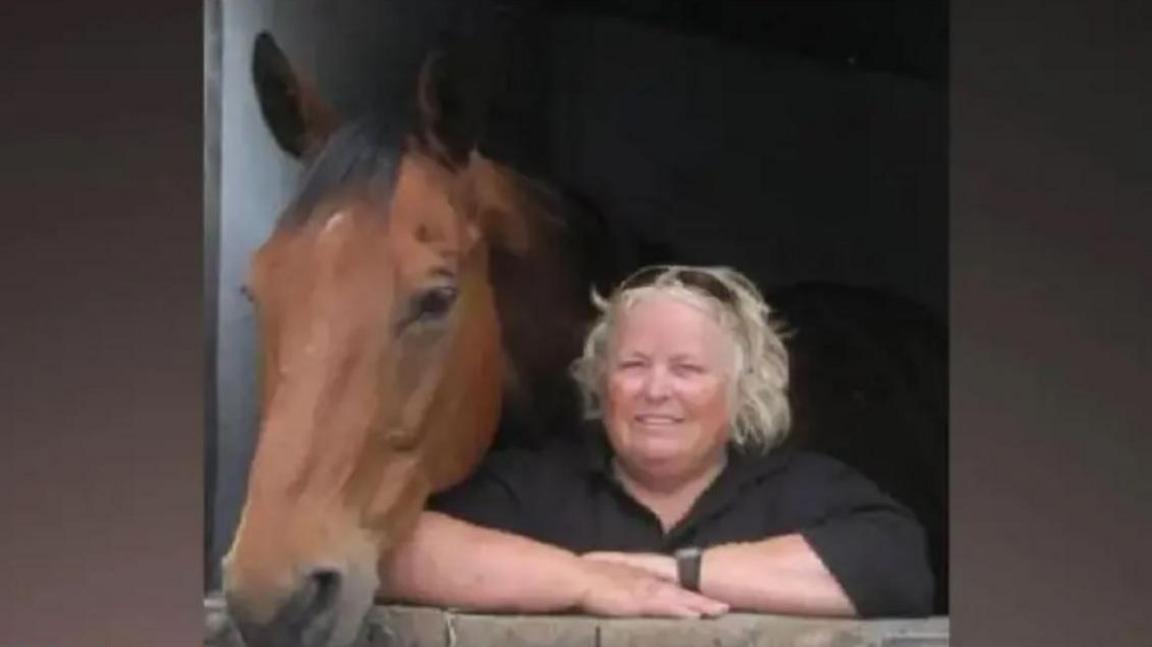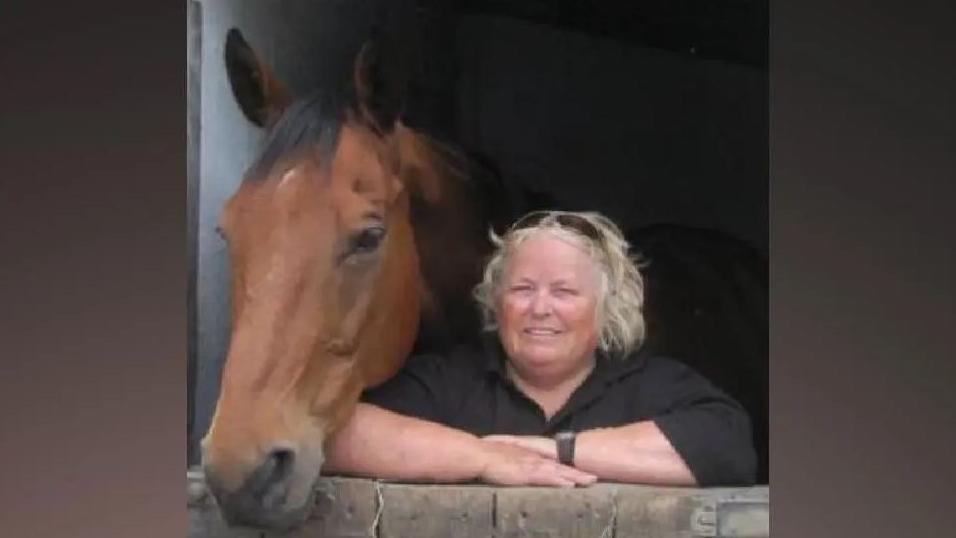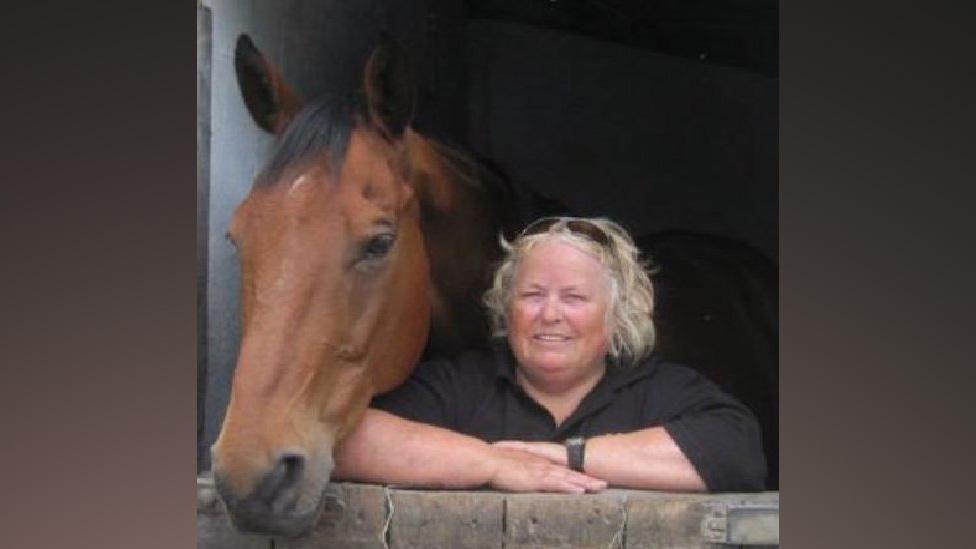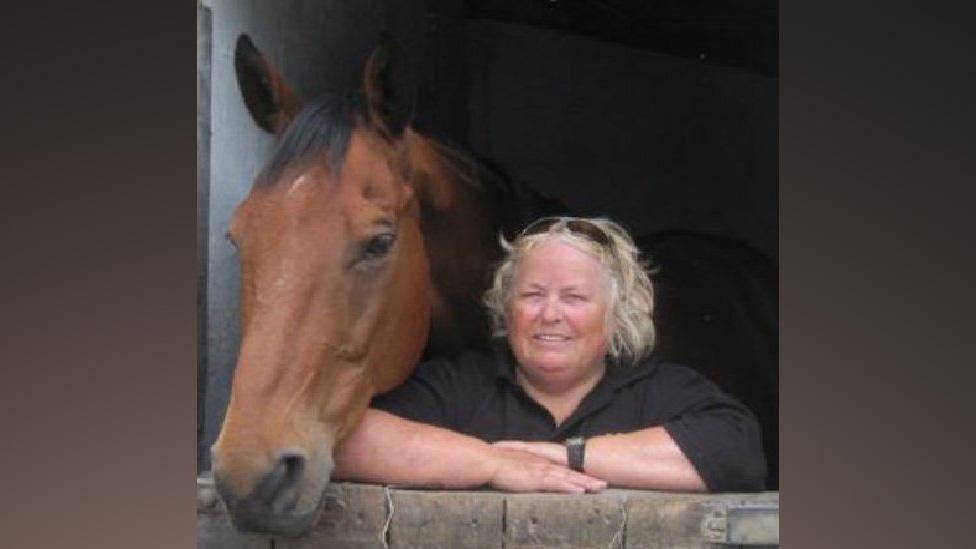Murder accused expects to die in prison

Wendy Buckney, 71, had been attacked with a table leg and stabbed repeatedly
- Published
A man accused of the murder of a retired riding instructor has told a jury he expects to die in prison.
Wendy Buckney, 71, was found battered and stabbed at her home in Clydach, Swansea, but Brian Whitelock, 57, said he had no memory of what happened, he heard voices and had brain injuries.
He walked out of the witness box at Swansea Crown Court when quizzed about his killing two men in 2000, including his own brother.
Mr Whitelock, defending himself, admits manslaughter of Ms Buckney in August 2022 on the grounds of diminished responsibility, but denies murder.
The court was shown CCTV and heard audio recordings of Mr Whitelock outside Ms Buckney's flat covered in blood, telling a neighbour he had killed her.
She was found naked and her body was covered with furniture.
Murder accused's DNA found on victim's underwear
- Published19 November 2024
Victim was 'nicest person in the world' - murder accused
- Published14 November 2024
Man admits manslaughter of retired horsewoman
- Published8 May 2024
Ms Buckney had been attacked with a table leg, a piece of shelving and had been stabbed repeatedly.
Her injuries were so severe a pathologist was unable to count the stab wounds accurately.
Mr Whitelock described her death as horrific.
He told the court: "I am sorry, I can't ever forgive myself. I can't come to terms with what's happened. I expect to die in jail. I deserve to. I have no recollection."
In the weeks before Ms Buckney died, Mr Whitelock claimed he suffered two significant head injuries.
He told the court "everything changed" after he fell from a derelict bridge while fishing.
He said his attack on Ms Buckney was "out of character".
In 2001, Mr Whitelock was sentenced to life in prison for killing two men, including his brother, at a house in Swansea in 2000.
He was convicted of murdering Nicky Morgan at his home and of the manslaughter of his brother Glenn, who was asleep upstairs.
He told the court: "Twenty-odd years ago I killed someone in a fight.
"People go on about a history of violence, I have no history of violence apart from that. I served a long sentence and kept my head down.
"If I hadn't had the bang on the head, this wouldn't have happened."
Mr Whitelock said he did not remember going into Ms Buckney's house.
"It must have been me that caused Wendy's death," he said.
Mr Whitelock said he had know Ms Buckney for "some time" and did odd jobs for her like gardening and laying tiles.
"She was really lovely, one of the most genuine people I know," he added.
"She helped me a lot. It's difficult to talk about. She would do anything to help me.
"Before all this happened I had a normal life on a day-to-day basis, I was no bother to anyone."
He said he suffered memory loss and confusion.
He became so confused, he said, he forgot he was a dad to a son and daughter.
The court before Ms Buckney’s death Mr Whitelock went days without sleep and food and was prescribed strong sleeping tablets.
On walking out of the witness box he told the judge, Mr Justice Griffiths: "I am not answering any more questions.
"You can go on the medical evidence. I can’t defend myself. You say it’s a fair trial? Get me out."
Chris Rees KC, prosecuting, said Mr Whitelock used extreme violence in 2000 and again in the murder of Ms Buckney.
Mr Whitelock said: "I have spent 18 years in prison. I'm not answering questions about a trial 24 years ago, I went through this 24 years ago.
"I was found guilty and served my time, this has no relevance in this case whatsoever.
"This is just your way of trying to tie me in knots and make me out to be a liar."
Mr Rees said Mr Whitelock lied during the trial and blamed his brother for Mr Morgan's murder to "save his own skin".
Mr Whitelock said: "How do you know that was a lie?
The jury heard Mr Whitelock was arrested and questioned about Ms Buckney's death at Swansea Central Police station.
An officer overheard him saying: "I'm not doing another life sentence for murder."
Mr Rees said Mr Whitelock's objective was to lie to avoid another life sentence.
Mr Whitelock claimed he could not remember what happened at Ms Buckney's ground floor flat.
He told the court: "My brain has gone through a hell of an experience. I am not going to allow (you) to make me out to be a liar."
Mr Rees said: "You lied in 2001 and you are lying now. You do know what happened but have chosen not to tell the truth.”
The case continues.
- Published20 November 2024

- Published13 November 2024

- Published14 November 2024
